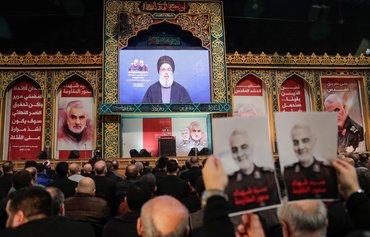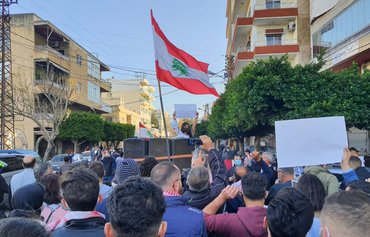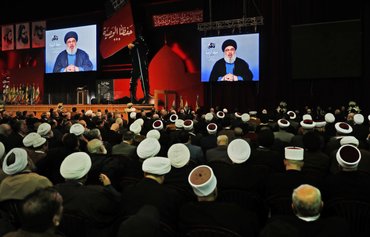An inflammatory speech in which Hizbullah chief Hassan Nasrallah vowed to remain in Syria "until further notice, and even after a settlement is reached in Idlib" has drawn an uneasy response from Lebanon's Shia community.
In a speech delivered September 19th, on the eve of Ashura, Nasrallah claimed the continuing presence of Hizbullah fighters in Syria "is based on need and the consent of the Syrian leadership".
This piece of rhetoric revealed Hizbullah’s intentions and "caused unease within the Shia community over the group's involvement in foreign wars", said Shia activist and university lecturer Mona Fayad.
"Hizbullah has given its supporters nothing but wars and further social and economic deterioration," she told Al-Mashareq, adding that this is leading to a growing feeling of anxiety among Lebanon's Shia community.
Nasrallah's public assertion that Hizbullah will remain in Syria is in complete opposition to the Lebanese government's policy of dissociation.
He even went as far as to call political forces in Lebanon for "refraining from dissociation, because what is taking place in the region is shaping its and Lebanon’s fate", according to his September 19th speech.
'Baffling' contradictions
Change Movement head Elie Mahfoud said he was baffled by the "contradictions in Nasrallah's speech".
The Hizbullah leader said the Lebanese state can dissociate itself because there is disagreement over the region's issues, "while he continues to intervene and fight in Syria", Mahfoud said on his Twitter account.
"Who else but [Nasrallah] intervenes and inserts himself in Syria?" he said. "Is dissociation specific to everyone in the state except Hizbullah?"
"How long will Hizbullah continue to fight for foreign countries?" he added. "I ask them: Do you, Hizbullah, work for Bashar al-Assad and follow his orders, or are you Lebanese and therefore are obligated to adhere in full to Lebanese laws?"
Hizbullah has nothing left in Lebanon but rhetoric, said Fares Souaid, former Lebanese MP and former secretary-general of the March 14th alliance.
"Nasrallah is deluding himself and people that he is victorious, while his speech -- psychologically, politically and realistically speaking -- represents the first precursor of Hizbullah’s fall," he told Al-Mashareq.
The Future bloc has previously condemned and called for a stop to Hizbullah’s military involvement in Syria, and has criticised the party's disavowal of the policy of dissociation, saying this foments problems in Lebanon.
It has called on Hizbullah to "return to the path of national rationality and withdraw from the cauldron of the ongoing conflict in Syria".
It also urged Hizbullah "to stop its involvement in the fighting in a war that has nothing to do with the Lebanese people" and to bring back Lebanese youth safe, and "not in coffins".
The UN in May called on Hizbullah not to engage in military activity inside Lebanon or elsewhere in the region, in line with a 2004 UN resolution.
In a May 24th report sent to the Security Council, UN Secretary-General Antonio Guterres said "the maintenance by Hizbullah of sizeable and sophisticated military capabilities outside the control of the government of Lebanon remains a matter of grave concern".
The Lebanese government must prevent Hizbullah from "building paramilitary capacity outside the authority of the state", he said.

![Supporters of Lebanon's Hizbullah gather near a poster of Hassan Nasrallah during a ceremony to mark Ashura on September 20th in Beirut. [Anwar Amro/AFP]](/cnmi_am/images/2018/10/09/14835-Lebanon-Beirut-Hizbullah-600_384.jpg)







You just care about Hezbullah and al-Sayyid Hassan Nasrallah! You talk about al-Sayyid Hassan Nasrallah all the time, and when you do, you can go pray because merely uttering his name will cleanse you, o, filthy people.
Reply1 Comment(s)